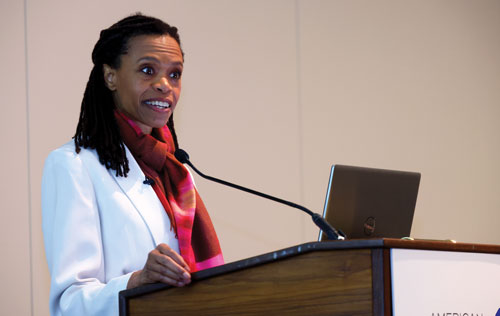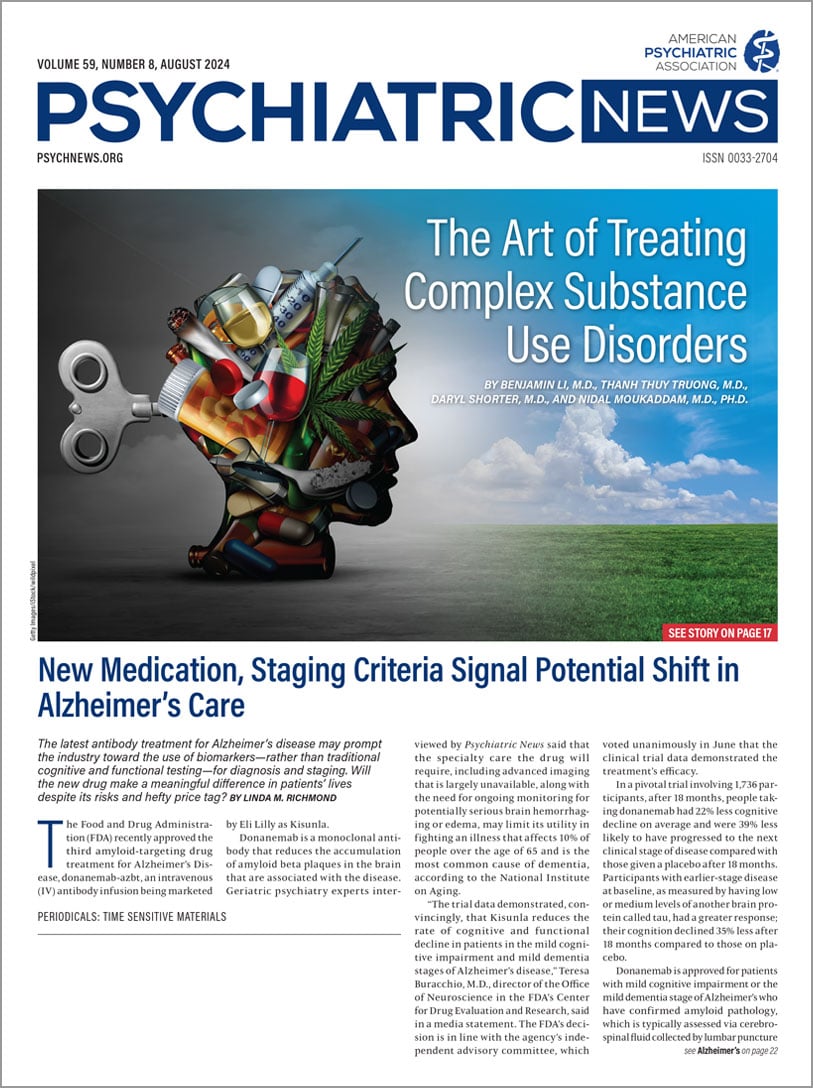The roadmap for improvement of mental health worldwide may well be found in the global goals for sustainable development that were adopted by the United Nations, according to the awardee of this year’s Chester M. Pierce Human Rights Award.
The goals include a commitment to address many of the social determinants of health: provide clean water and sanitation; address climate change; and end poverty, hunger, discrimination, and gender inequality.
“The Agenda for Sustainable Development provides a powerful vision for wholeness in our world that is desperately needed and is perhaps our greatest guide for global mental health,” said Pamela Y. Collins, M.D., M.P.H., chair of APA’s Council on International Psychiatry and Global Health and the Bloomberg Centennial Professor and Chair of the Department of Mental Health at the Johns Hopkins Bloomberg School of Public Health.
Collins was honored with the prestigious award for her decades of work in global mental health and advancing the understanding of how to expand access to mental health services among underserved populations around the world. In her lecture, Collins described power structures that create barriers to sustainable development and also underlie mental health threats: suicide risk among Arctic Indigenous communities; vulnerabilities to HIV among people with serious mental illness around the globe; and mental health disparities faced by young people living in urban environments.
Systems of power have led to disparities in mental health between countries as well as for people in historically marginalized communities, Collins explained.
Collins recalled how she was invited by Pierce, with whom she shared a keen interest in global mental health, to serve as the U.S. delegate to his 2002 Conference on the Psychiatry of the African Diaspora. There, she presented two threats to African American mental health and well-being: racism, or racialized stigma and discrimination, as well as HIV, which disproportionately affects Black people in the United States and around the world and has implications for mental health.
Her survey of Black psychiatrists and trainees at that time found their biggest concerns included the social problems of poverty, unemployment, incarceration, and the clinical issues of trauma, alcohol and substance use, and depression. Across the multiple countries represented at the conference, racism and the effects of colonialism were consistent threats to mental health and wellbeing, she noted.
“A thread that unified these presentations was their recognition of social drivers of poor mental health, most of which can be linked to systems of power,” Collins said.
Collins discussed her work with RISING SUN, a multi-nation collaboration focused on suicide prevention among Arctic Indigenous people. “We noted that high rates of suicide among Indigenous youths in the Arctic are a relatively recent phenomenon coinciding with colonial intrusions into traditional lifestyles, rapid modernization, cultural disruption, and policies of cultural assimilation,” she said.
She and her colleagues conducted a study that identified a range of interventions to help prevent suicide across the Arctic. Greenland, a former colony of Denmark with a majority Inuit population, was one country with a sharp increase in suicide rates linked to colonization and rapid socioeconomic and cultural change, she explained.
Suicide deaths rose in the mid- to late-70s, peaking in the late 80s, and have declined steadily in Greenland since then. They remain elevated, with one recent study showing 81 suicide deaths per 100,000 people, compared with 9 per 100,000 people globally.
She used a
case study written by National Public Radio correspondent Rebecca Hersher to illustrate how colonial power dynamics influenced mental health outcomes. Colonial disruption led to displacement and a subsequent cluster of suicides among young men from the village of Kangeq in Greenland. One displaced Kangeq villager, Anda Poulsen, whose life was disrupted by dislocation and subsequent social marginalization, went on to launch a mental health crisis hotline to serve his Greenland community. The lesson? “That people with lesser power can exert influence that has very powerful implications,” Collins said.
Collins ended her talk reminding the audience that power dynamics are complex: there is no powerful-powerless dichotomy and that “public health responses—prevention and care—include mobilizing forms of power.”
The Chester M. Pierce Human Rights Award recognizes the extraordinary efforts of individuals to promote the human rights of populations with mental health needs by bringing attention to their work. Originally established in 1990 to raise awareness of human rights abuses, the award was renamed in 2017 to honor Chester M. Pierce, M.D. (1927-2016) in recognition of his dedication as an advocate against disparities, stigma, and discrimination, and a pioneer and visionary in global mental health. ■

